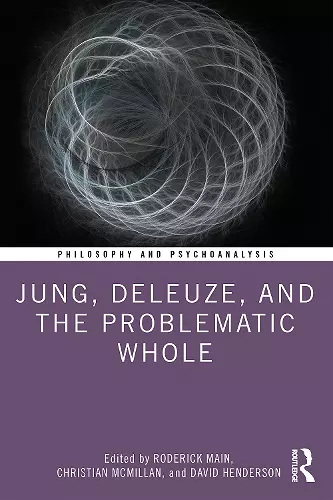Jung, Deleuze, and the Problematic Whole
David Henderson editor Roderick Main editor Christian McMillan editor
Format:Paperback
Publisher:Taylor & Francis Ltd
Published:2nd Sep '20
Currently unavailable, and unfortunately no date known when it will be back
This paperback is available in another edition too:
- Hardback£115.00(9780367428747)

This book of expert essays explores the concept of the whole as it operates within the psychology of Jung, the philosophy of Deleuze, and selected areas of wider twentieth-century Western culture, which provided the context within which these two seminal thinkers worked.
Addressing this topic from a variety of perspectives and disciplines and with an eye to contemporary social, political, and environmental crises, the contributors aim to clarify some of the epistemological and ethical issues surrounding attempts, such as those of Jung and Deleuze, to think in terms of the whole, whether the whole in question is a particular bounded system (such as an organism, person, society, or ecosystem) or, most broadly, reality as a whole.
Jung, Deleuze, and the Problematic Whole will contribute to enhancing critical self-reflection among the many contemporary theorists and practitioners in whose work thinking in terms of the whole plays a significant role.
'This extraordinary, edited volume is based on key papers from the first conference of its kind exploring the problematic arising from the writings of C. G. Jung, and Giles Deleuze on holism. The wealth of expertise offered here provides a much-needed in-depth exploration of rhizomatic holism found in Jung and Deleuze, but is also further expanded to assist readers in realizing the tremendous implications for 21st-century psychology and philosophy. The editors are to be celebrated for crafting this remarkable collection; it will not disappoint!’
Joseph Cambray, PhD, President/CEO, Pacifica Graduate Institute
‘The configuration of systems and the relationships of interconnecting parts to a whole is a fascinating conceptual puzzle, and one vital to our understanding of the functioning of society and our relationship with ourselves, others, and the world at large. Jung, Deleuze, and the Problematic Whole asks important epistemological and ethical questions of wholeness through the lens of heavyweight thinkers, Gilles Deleuze and C. G. Jung. Written by experts in continental philosophy and Jungian studies, this book is insightful in its scrutiny of a variety of interrelated issues, including reductionism, totalitarianism, privilege and exclusion, identity, creativity, and personal and social transformation. A wholly compelling book.’
Lucy Huskinson, Professor of Philosophy, Bangor University, UK; author of Architecture and the Mimetic Self (Routledge, 2018)
‘Jung, Deleuze, and the Problematic Whole is essential reading for those interested in the flourishing area of Jung/Deleuze studies. From a Jungian perspective, Deleuze’s ideas allow an interpretation of Jung’s writing on the unus mundus that both critiques and revitalizes his work. For those who study Deleuze, this is added evidence of the potential for a psychology consonant with the ideas of schizoanalysis. Overall, this book marks an important contribution to the ongoing exploration of Jung’s influence on the philosopher of the rhizome.’
Barbara Jenkins, Professor, Department of Communication Studies, Wilfred Laurier University; author of Eros and Economy: Jung, Deleuze, Sexual Difference (Routledge, 2016)
'This extraordinary, edited volume is based on key papers from the first conference of its kind exploring the problematic arising from the writings of C. G. Jung, and Gilles Deleuze on holism. The wealth of expertise offered here provides a much-needed in-depth exploration of rhizomatic holism found in Jung and Deleuze, but is also further expanded to assist readers in realizing the tremendous implications for 21st-century psychology and philosophy. The editors are to be celebrated for crafting this remarkable collection; it will not disappoint!’
Joseph Cambray, PhD, President/CEO, Pacifica Graduate Institute
‘The configuration of systems and the relationships of interconnecting parts to a whole is a fascinating conceptual puzzle, and one vital to our understanding of the functioning of society and our relationship with ourselves, others, and the world at large. Jung, Deleuze, and the Problematic Whole asks important epistemological and ethical questions of wholeness through the lens of heavyweight thinkers, Gilles Deleuze and C. G. Jung. Written by experts in continental philosophy and Jungian studies, this book is insightful in its scrutiny of a variety of interrelated issues, including reductionism, totalitarianism, privilege and exclusion, identity, creativity, and personal and social transformation. A wholly compelling book.’
Lucy Huskinson, Professor of Philosophy, Bangor University, UK; author of Architecture and the Mimetic Self (Routledge, 2018)
‘Jung, Deleuze, and the Problematic Whole is essential reading for those interested in the flourishing area of Jung/Deleuze studies. From a Jungian perspective, Deleuze’s ideas allow an interpretation of Jung’s writing on the unus mundus that both critiques and revitalizes his work. For those who study Deleuze, this is added evidence of the potential for a psychology consonant with the ideas of schizoanalysis. Overall, this book marks an important contribution to the ongoing exploration of Jung’s influence on the philosopher of the rhizome.’
Barbara Jenkins, Professor, Department of Communication Studies, Wilfred Laurier University; author of Eros and Economy: Jung, Deleuze, Sexual Difference (Routledge, 2016)
ISBN: 9780367428754
Dimensions: unknown
Weight: 920g
220 pages